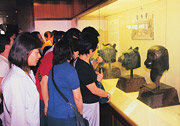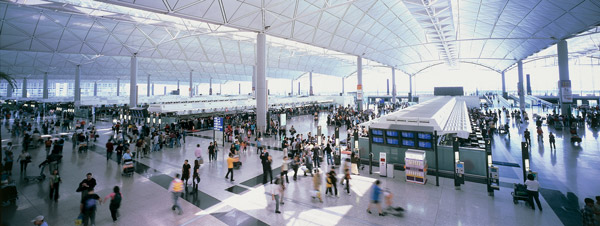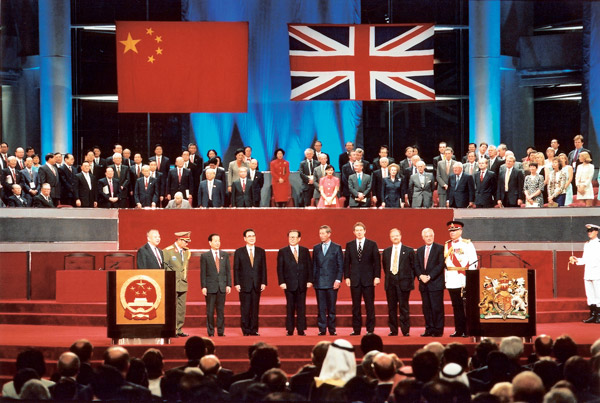-
1999-2000
- In the wake of the financial crisis, the Hong Kong Monetary Authority
in July 1999 announced a three-year reform programme to further enhance
competitiveness, efficiency and competition in the banking sector.
- Three people died and 215 were injured when a China Airlines MD-11
crash-landed at Hong Kong International Airport during gale force winds
and torrential rain brought on by Typhoon Sam on August 22, 1999.
- In November 1999, the HKSARG and The Walt Disney Company announced
plans to build a Disney theme park and destination resort on Lantau
Island. The 126-hectare project, due to open in 2005, is a central element
in Hong Kong's plans to upgrade its tourism facilities and attractions
to remain the most popular destination in Asia.
- The Tracker Fund of Hong Kong — set up to dispose
of shares acquired during the August 1998 stock market incursion —
was launched on November 12, 1999, after being oversubscribed by almost
five times.
- The Stock Exchange of Hong Kong Ltd (SEHK) entered into a strategic
alliance with NASDAQ-AMEX that would allow companies listed on the US
counter to be traded on the SEHK to facilitate around-the-clock trading
of stocks.
- Also in November, the Growth Enterprise Market (GEM) —
modeled on the NASDAQ — was launched by the SEHK to
provide growth and emerging companies with access to funds from the
investing public.
- The first District Council elections of the Hong Kong SAR were held
on November 28, 1999.
- The Legislative Council voted on December 2, 1999, to abolish the
two municipal councils to streamline the provision of food, hygiene,
leisure and cultural services.
- The Court of Final Appeal upheld laws making it a criminal offence
to desecrate or defile the national and regional flags. The unanimous
ruling by the five CFA judges which was handed down on December 15 confirmed
that the flag laws were consistent with the guarantee of free speech
in both the Basic Law and the International Covenant on Civil and Political
Rights.
- In February 2000, The Chief Executive's Commission on Strategic Development
released its report on the long-term economic development of Hong Kong.
The report found that Hong Kong needed to do more in four key areas:strengthen
links with the Mainland; enhance competitiveness; improve the quality
of life; and, reinforce Hong Kong's identity and image locally and abroad.
- Hong Kong's stock and futures exchanges and clearing houses were merged
into a single entity on March 6, 2000 — Hong Kong
Exchanges and Clearing Ltd — to rationalise the operation
of the securities and futures markets and boost the efficiency of the
local bourse.
- Taiwan announced plans to establish 'small scale' direct links with
two Mainland ports — the first direct links since 1949. The decision was expect to have little impact on Hong Kong where cross-straits trade accounted for 6% of trade volumes.
- Four national treasures taken from China in the 19th Century were
auctioned in Hong Kong in early May 2000, sparking calls for laws in
the SAR to protect cultural relics. Three Mainland enterprises paid
a total of HK$52.3 million (US$6.7 million) for the relics—
three bronze animal heads and a hexagonal Qing Dynasty vase—
which were returned to Beijing for public display.
- A new package of measures was announced in May 2000 to improve air
quality by providing incentives to hasten the introduction of cleaner
vehicles and fuel and to significantly reduce harmful emissions by diesel
vehicles.
- The Secretary for Justice, Elsie Leung Oi-see, 61, was reappointed
on May 16, 2000, for a further two-year contract.
- The US Congress voted on May 24 to grant Permanent Normal Trade Relations
status to China as part of the Sino-US deal on the Mainland's accession
to the World Trade Organisation.
1998-1999
- The new Hong Kong International Airport at Chek Lap Kok opened to
air traffic on July 6, 1998. The airport was the centerpiece of an eight-year,
US$20 billion infrastructure programme to maintain Hong Kong's role
as a leading regional transport and communications hub.
- The opening of the airport was initially plagued with technical problems
that disrupted passenger and baggage handling and air cargo processing
services. However, the airport quickly established its credentials as
one of the world's most modern and efficient, winning accolades from
engineers and the travel industry.

- Hong Kong was hit hard by the fallout from the Asian financial crisis
in 1998, when GDP contracted by 5.1% — the first full-year
contraction since records started in 1961.
- A liquidity crunch caused by the financial crisis created conditions
for a massive and sustained speculative attack against the Hong Kong
Dollar and stock markets in August 1998. This prompted a defensive operation
by the HKSARG, which spent HK$118 billion (US$15.1 billion) buying the
constituent stocks of the Hang Seng Index.
- The defensive actions prevented a meltdown of the economy and saved
Hong Kong's linked exchange rate to the US Dollar under the currency
board system from collapse.
- Following a landmark Court of Final Appeal (CFA) ruling on the right
of abode on January 29, 1999, a government survey subsequently found
that up to 1.67 million people would be newly eligible under the ruling
on permanent residency in Hong Kong over the next decade.
- Such a serious social and financial impact, and the fact the matter
could not be resolved by Hong Kong alone, prompted the government in
May 1999 to ask the State Council seek an interpretation of the Basic
Law's right of abode provisions from the Standing Committee of the National
People's Congress.
- The Standing Committee's June 1999 interpretation on who was entitled
to the right of abode in the Hong Kong SAR was subsequently upheld as
lawful and constitutional by the CFA. Court cases relating to this issue
continued to be heard by the CFA well into 2002.
- The HKSARG opened a liaison office in Beijing in March 1999 to facilitate
contacts between the HKSARG and the Central Government.
- Also in March 1999 the Chief Executive, Mr Tung, announced that the
Chief Secretary for Administration, Mrs Anson Chan, would stay in her
position for another 2½ years after she reached the retirement age of
60 in January 2000. Mrs Chan left government service in April 2001.
1997-1998
- Dignitaries from around the world gathered in Hong Kong to witness
the reunification of Hong Kong and the establishment of the Hong Kong
Special Administrative Region of the People's Republic of China on July
1, 1997.

- The Basic Law, Hong Kong's constitutional document, came into effect
guaranteeing Hong Kong's way of life for 50 years after 1997. Hong Kong
people were responsible for the running of their own affairs, with the
exception of defence and foreign affairs.
- The Court of Final Appeal (CFA), the SAR's highest appellate court,
was set up on July 1. It heard its first application for leave to appeal
in September 1997 and its first substantive appeal in December 1997.
Judges from other common law jurisdictions have sat on the CFA's full
bench of five judges.
- The World Bank/IMF held its annual meetings in Hong Kong in September
1997.
- The Asian financial crisis hit in October 1997, causing a steep plunge
in stock market capitalisation and property prices. The Hong Kong Dollar
also came under speculative attack.
- A new strain of avian'flu, detected for the first time in humans in
August 1997, led to the death of six people. The government ordered
the slaughter of 1.5 million chickens over three days in December 1997,
prompting the World Health Organisation to say that the actions had
prevented a global pandemic.
- Records tumbled in the first Legislative Council (LegCo) elections
of the HKSAR held on May 24, 1998 — record number
of candidates (166), record number of voters (1.49 million), record
turnout rate (53%) and record voter registration (2.8 million). All
60 LegCo seats returned by elections.
- High-powered Hong Kong Guangdong Joint Co-operation Conference set up to comprehensively strengthen co-operation with Guangdong Province and improve co-ordination in the booming Pearl River Delta area on a range of issues such as trade and economics, infrastructure development, transport links and people flows.